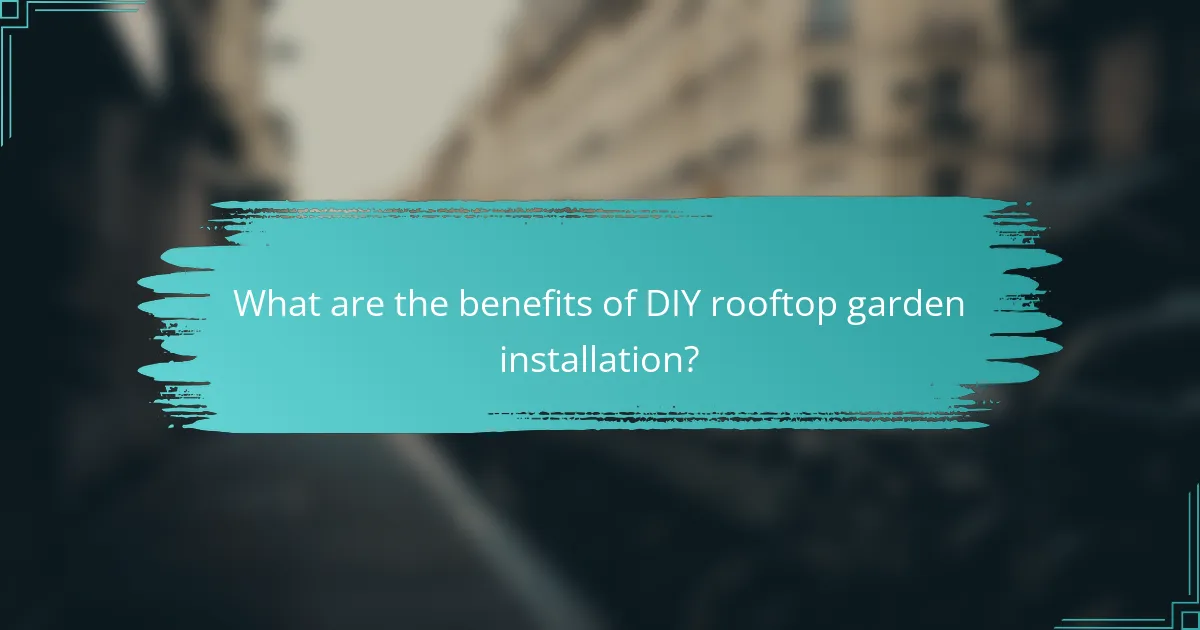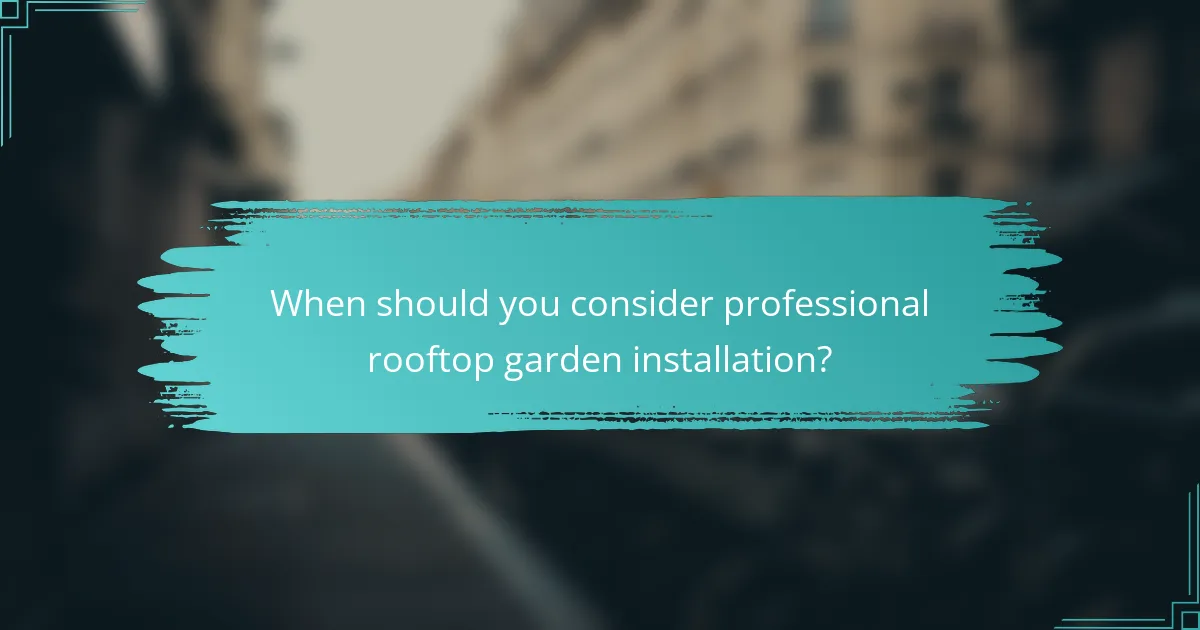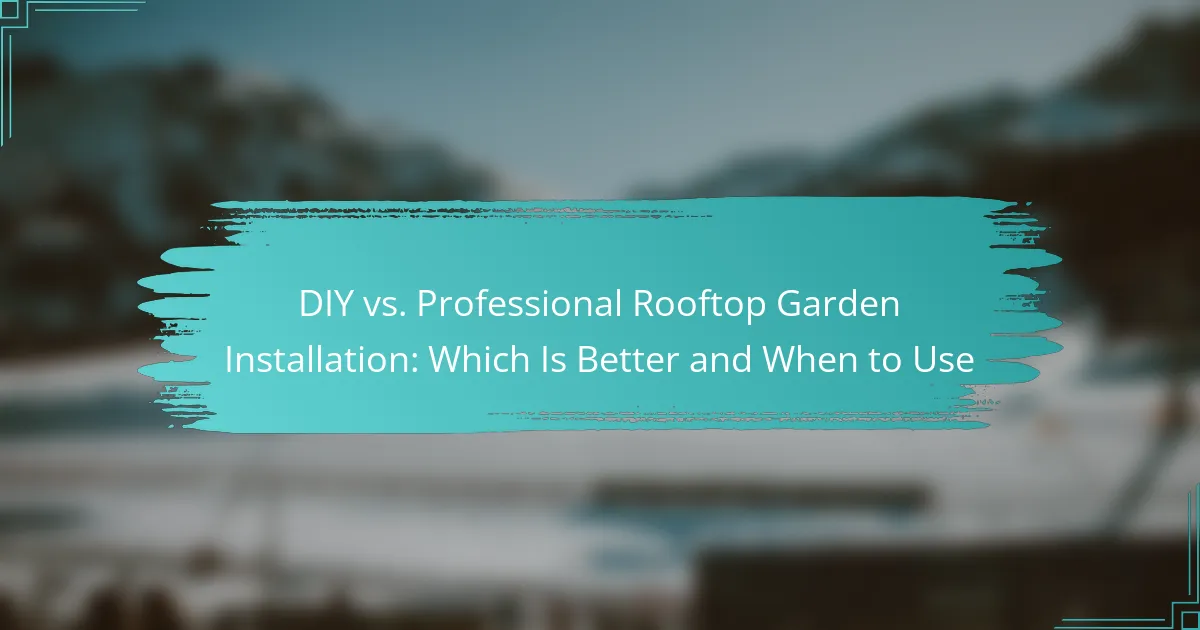When deciding between a DIY rooftop garden installation and hiring professionals, it’s important to consider your budget, design complexity, and personal expertise. DIY projects can offer cost savings and a chance to personalize your space, while professional installations ensure structural integrity and compliance with regulations. Evaluating these factors will help you determine the best approach for creating your ideal rooftop oasis.

What are the benefits of DIY rooftop garden installation?
DIY rooftop garden installation offers several advantages, including cost savings, personalization options, and a valuable learning experience. By taking on this project yourself, you can create a unique space that reflects your style while potentially saving money compared to hiring professionals.
Cost savings
One of the primary benefits of a DIY rooftop garden is the potential for significant cost savings. Hiring professionals for installation can often lead to expenses in the low thousands of dollars, while a DIY approach can reduce costs to hundreds, depending on the materials and plants chosen.
To maximize savings, consider sourcing materials from local suppliers or using recycled items. This can help keep your budget in check while still achieving a beautiful garden space.
Personalization options
With a DIY rooftop garden, you have complete control over the design and layout, allowing for endless personalization options. You can select plants that suit your aesthetic preferences, choose specific containers, and create unique features like seating areas or pathways.
Additionally, you can tailor the garden to meet your specific needs, such as incorporating edible plants or creating a relaxing retreat. This level of customization is often not possible with professional installations, which may follow a standard design template.
Learning experience
Installing a rooftop garden yourself provides a valuable learning experience that can enhance your gardening skills and knowledge. You’ll gain hands-on experience with plant selection, soil preparation, and maintenance, which can be beneficial for future gardening projects.
Moreover, this experience can foster a deeper connection to your garden, as you will understand the effort and care that goes into creating and maintaining the space. Embrace the challenges and enjoy the satisfaction of watching your garden flourish as a result of your hard work.

When should you consider professional rooftop garden installation?
Consider professional rooftop garden installation when the project involves complex designs, tight timelines, or specialized expertise. Hiring professionals can ensure that your garden is not only aesthetically pleasing but also structurally sound and compliant with local regulations.
Complexity of design
If your rooftop garden features intricate designs, such as tiered levels, integrated irrigation systems, or unique plant selections, professional installation is advisable. Experts can navigate the challenges of weight distribution, drainage, and plant compatibility, ensuring a successful outcome.
For example, a garden with multiple plant types and varying light requirements may necessitate a carefully planned layout that professionals can provide. Their experience helps avoid common pitfalls that can arise from DIY attempts at complex designs.
Time constraints
When facing tight deadlines, hiring professionals can expedite the installation process. Experienced teams can complete projects more quickly than most DIYers, who may need to learn and troubleshoot along the way.
For instance, if you want your rooftop garden ready for a specific event or season, professionals can often meet these timelines more reliably. This is particularly relevant in urban areas where weather conditions can impact construction schedules.
Expertise requirements
Rooftop gardens require knowledge of structural integrity, local building codes, and horticultural practices. Professionals bring this expertise, ensuring that the installation meets safety standards and thrives over time.
For example, understanding how to properly install a waterproof membrane is crucial to prevent leaks. If you lack experience in these areas, it’s wise to consult with professionals to avoid costly mistakes and ensure long-term success for your rooftop garden.

How do DIY and professional installations compare in cost?
DIY rooftop garden installations generally cost less upfront than hiring professionals, but the total expenses can vary significantly based on the complexity of the project. While DIY projects may save on labor costs, they can incur additional expenses for materials and potential mistakes, making it essential to weigh both options carefully.
Average DIY costs
The average cost for a DIY rooftop garden can range from a few hundred to a few thousand dollars, depending on the materials and plants chosen. Basic setups with container gardens or simple planters may start around $300, while more elaborate designs with soil, irrigation systems, and diverse plant selections can exceed $2,000.
When planning a DIY project, consider costs for soil, plants, drainage, and any necessary tools. It’s wise to budget for unexpected expenses, as mistakes can lead to additional costs for replacements or corrections.
Average professional costs
Hiring professionals for rooftop garden installation typically ranges from $1,500 to $10,000 or more, depending on the project’s scale and complexity. This includes labor, design, and high-quality materials, ensuring a polished and functional result.
Professional services often provide warranties and ongoing maintenance options, which can justify the higher initial cost. It’s essential to obtain multiple quotes and check references to ensure you’re getting the best value for your investment.
Long-term value considerations
While DIY installations may save money initially, professional installations often offer better long-term value through durability and expert design. A well-executed professional garden can increase property value and reduce maintenance costs over time.
Consider the potential for increased energy efficiency and stormwater management benefits with a professionally designed rooftop garden. Weigh these long-term advantages against the initial costs to determine the best approach for your situation.

What factors influence the decision between DIY and professional installation?
The decision between DIY and professional installation for a rooftop garden depends on several key factors, including available resources, local regulations, and climate considerations. Understanding these elements can help you choose the best approach for your specific situation.
Available resources
Assessing your available resources is crucial when deciding between DIY and professional installation. Consider your budget, time, and skills. DIY projects can save money but may require significant time and effort, while hiring professionals can streamline the process but typically comes at a higher cost.
If you have access to tools, materials, and knowledge, a DIY approach may be feasible. However, if you lack experience or the necessary equipment, hiring a professional might be more efficient and ensure a higher-quality outcome.
Local regulations
Local regulations can significantly impact your decision regarding rooftop garden installation. Many municipalities have specific zoning laws, building codes, or permit requirements for rooftop gardens. Researching these regulations beforehand is essential to avoid potential fines or project delays.
In some areas, you may need to submit plans for approval or ensure that your garden meets certain safety standards. Consulting with local authorities or a professional can help you navigate these requirements effectively.
Climate considerations
Climate plays a vital role in determining the success of a rooftop garden and can influence your choice between DIY and professional installation. Different plants thrive in varying conditions, and understanding your local climate will help you select appropriate vegetation.
For example, if you live in a region with extreme temperatures or heavy rainfall, you may need specialized knowledge to create a sustainable garden. Professionals often have experience with climate-specific designs and can recommend suitable plants and materials, making their services valuable in challenging environments.

What are the best plants for rooftop gardens in urban areas?
The best plants for rooftop gardens in urban areas are those that can thrive in limited soil depth and withstand varying weather conditions. Consideration for sunlight, wind exposure, and maintenance needs is crucial when selecting plants for these elevated spaces.
Succulents
Succulents are ideal for rooftop gardens due to their low water requirements and ability to store moisture. Varieties such as Sedum, Echeveria, and Aloe thrive in sunny conditions, making them perfect for urban rooftops that receive ample sunlight.
When choosing succulents, ensure they are planted in well-draining soil to prevent root rot. Grouping different types can create an attractive display while also maximizing space. Regularly check for pests, as some succulents can be susceptible to mealybugs and aphids.
Herbs
Herbs like basil, thyme, and rosemary are excellent choices for rooftop gardens, offering both culinary benefits and aromatic qualities. They generally require moderate sunlight and can adapt well to container gardening, which is often necessary in urban settings.
To maximize growth, use lightweight potting mixes and ensure pots have drainage holes. Regular harvesting encourages bushier growth, and incorporating companion planting can help deter pests naturally. Be mindful of local regulations regarding herb cultivation, especially if planning to grow larger quantities.
